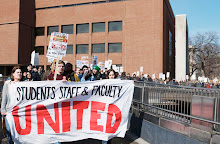Fiscal circumstances now and for the foreseeable future require the University of Minnesota to reduce its expenditures. Reductions should be made where they will least impair the University’s core missions of education, research, and outreach. Prior to eliminating academic units and programs, therefore, it is essential that broad scrutiny of the University’s finances and operations be undertaken, in order to determine where economies may be implemented with minimal impact on the academic mission. The faculty, who bear primary responsibility for carrying out the mission, must play a commensurate role in determining where budgetary reductions are advisable. As the Senate Committee on Finance and Planning is the governance body charged with advising the administration on financial and operational planning, it is this committee that must spearhead this undertaking.
Accordingly, we propose that this committee commence an ongoing, proactive review of the University’s finances and operations, selecting one or more initiatives, programs, or units to examine per year, and conducting for each one a detailed cost/benefit analysis anchored to the University’s academic mission.
This review would focus on aligning the expenditure of resources with fulfillment of the academic mission. There are many areas where the alignment of expenses with the mission could be scrutinized. One such area is central administration. The size and cost of central administration have grown more, both in absolute terms and as a proportion of the University’s budget, than any other part of the University’s operations. There is widespread concern about rising administrative costs and about whether these costs represent the optimal means of serving the University’s mission. Central administration should therefore be the first “item” chosen for review. The review should scrutinize every office comprised within central administration, examining what each one currently costs, what it does for the university’s mission, and whether that could be accomplished for a lower cost.
Undertaking such reviews has the potential to yield more than financial benefits. First, they will help to identify areas where the University may economize without impairment of its academic mission. Second, by involving faculty and staff in the process of determining where cuts are made, such reviews will help develop confidence in the administration and support for the budgetary decisions that are made, confidence that is lacking among many faculty and staff now. This process will thus establish a new norm in faculty-administration relations in advance of the transition to a new administration.
Prepared by Bruce Braun, Eva von Dassow, and William Messing
Monday, April 26, 2010
Subscribe to:
Post Comments (Atom)


No comments:
Post a Comment